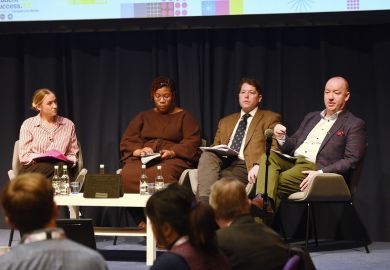While the results of the US election could be a determining factor in further substantiating its role as one of Europe’s superpowers, Germany has long been considered a site of pioneering research and innovation within the higher education sector.
However, the ability to transfer assets into a Covid-induced era of digitalisation could become the true test of a country’s ability to compete with top academic institutions around the world. The Times Higher Education Germany Academic Salon on 4 November will investigate how artificial intelligence can be used to advance digital transformation within the country’s universities, as well as its progress in reaching targets set by the United Nations’ Sustainable Development Goals (SDGs).
David Matthews, THE’s Europe reporter, said: “Germany is Europe’s leading R&D power, boasting top-notch research institutes investigating fundamental questions, but also some of the world’s biggest corporate investors in innovation. And yet it is beset with anxieties about falling behind technologically and not being ‘competitive’ with universities in the UK and US. As Germany pours ever more money into R&D, and manages to pull in top researchers from around the globe, it will be fascinating to see if the country can usher in a new golden age of German science.”
The programme for the half-day salon will begin with Peter-André Alt, president of the German Rectors’ Conference, reflecting on how Germany can expand its research portfolio through international outlook and enhanced digitalisation. Bernd Huber, president of Ludwig Maximilian University of Munich, and Jens Schneider, vice-president of transfer and international affairs at the Technical University of Darmstadt, will explore the benefits and drawbacks of collaboration between academic and industry experts in the interest of sustaining blue-sky research that could be undermined due to financial risks.
While funding remains at the forefront of university concerns, it is increasingly apparent that the true metric of a country’s viability as a frontrunner in innovation stems from its solutions to global challenges. The current generation of students are demonstrating more climate-conscious attitudes and demand tangible change from their leaders, and the day’s final panel will feature insights from Thomas Hofmann, president of the Technical University of Munich, and Jörg Rocholl, president of the European School of Management and Technology, as they discuss whether universities can uphold their pledges to address environmental and societal issues.
Supported by THE’s partners at Huawei Germany, the salon’s conversations will be bolstered by contributions from David Wang, Huawei’s chief representative of the Berlin office, and Ingobert Veith, their director of public policy, who will also lend his knowledge and expertise to the subject of future digitalisation.
“Starting 300 years ago, scholars have thought up and elaborated new philosophical and economic theories, which guided societies and industries to develop different policies, regulations and criteria to nurture and safeguard the prosperous development of the industrial age,” said Mr Wang. “Now, we are in the process of fast transformation towards the digital era. Once again, society and industries are facing tremendous change and need a new fundament of socio-philosophical theories, policies, regulations and criteria to guide and safeguard digitalisation. Professors and the whole academic world are thought lighthouses of this process.”
The programme will conclude with a data masterclass led by Phil Baty, THE’s chief knowledge officer, and Elizabeth Shepherd, THE’s managing director of consultancy services, as they identify trends to indicate how Germany can build on its performance in the THE World University Rankings.
Find out more and register for the THE Germany Academic Salon on 4 November.
Register to continue
Why register?
- Registration is free and only takes a moment
- Once registered, you can read 3 articles a month
- Sign up for our newsletter
Subscribe
Or subscribe for unlimited access to:
- Unlimited access to news, views, insights & reviews
- Digital editions
- Digital access to THE’s university and college rankings analysis
Already registered or a current subscriber?




